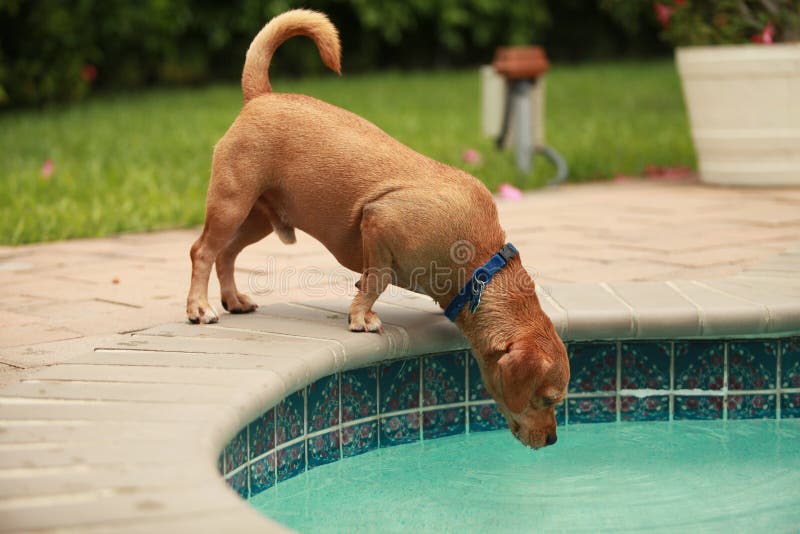While dogs can technically drink pool water, it’s generally not recommended. Pool water is treated with chemicals such as chlorine to keep it clean and safe for humans, but these chemicals can be harmful to dogs if ingested in large quantities.
Drinking too much-chlorinated water can cause stomach upset, vomiting, and diarrhea in dogs. In addition, pool water can be contaminated with bacteria, algae, and other substances that may be harmful to dogs. If a dog drinks a small amount of pool water, it’s generally not a cause for concern.
However, if your dog is drinking large amounts of pool water or showing signs of illness after drinking pool water, it’s best to contact your veterinarian for advice. It’s always a good idea to provide your dog with fresh, clean water to drink, especially during hot weather when they may be more likely to seek out sources of water to cool off.
How Do I Stop My Dog from Drinking Pool Water?
One of the best ways to stop your dog from drinking pool water is to provide them with fresh, clean water at all times. If you notice that your dog is particularly thirsty after swimming, make sure to offer them fresh water as soon as possible. You can also try adding some ice cubes to their water bowl or using a pet fountain.
Another way to deter your dog from drinking pool water is to train them not to. This will take some patience and consistency on your part, but it can be done. Start by teaching your dog the “leave it” command, and make sure they are well-versed in basic obedience commands before moving on to this one.
When you see your dog approach the pool, give the “leave it” command firmly and wait for them to obey. If they do not listen, you may need to use a leash or verbal correction in order for them to understand that this is not acceptable behavior. With time and patience, most dogs can learn not to drink pool water.
Is It Ok for Dogs to Lick Pool Water?
Dogs typically love the taste of pool water, and while it may seem harmless, there are actually a few dangers associated with letting your dog drink pool water. The biggest danger is the potential for your dog to develop gastrointestinal issues from ingesting chlorinated water.
While most dogs will be fine after licking a small amount of pool water, some may develop vomiting or diarrhea if they consume too much. In addition, pool water can also contain harmful bacteria that can make your dog sick. If you notice your dog licking the pool water, it’s best to stop them and give them fresh water to drink instead.
Are Chlorine Pools Safe for Dogs?
Chlorine pools are safe for dogs if the chlorine levels are well maintained. If the chlorine levels are too high, it can be irritating to a dog’s skin and eyes.
It is important to make sure that your dog does not drink the pool water, as it can cause an upset stomach.

Credit: www.dreamstime.com
What Happens If a Dog Drinks Chlorine Pool Water?
If your dog drinks pool water that contains chlorine, it may experience nausea and vomiting. In severe cases, they may also have difficulty breathing and could go into shock. If you think your dog has ingested chlorine, take them to the vet immediately.
Symptoms of Chlorine Poisoning in Dogs
Chlorine is a gas that is used in many industries, including the production of paper, textiles, and pesticides. It is also found in swimming pools and hot tubs. While chlorine itself is not poisonous, it can release toxic chemicals when it combines with other substances.
When these chemicals are inhaled or ingested, they can cause serious health problems in dogs. The most common symptom of chlorine poisoning in dogs is difficulty breathing. This is because the lungs are irritated by the fumes from the chlorine.
In severe cases, the dog may stop breathing altogether and need to be resuscitated. Other symptoms include coughing, wheezing, and inflammation of the throat and airways. If your dog has been exposed to chlorine gas, it is important to get him to fresh air immediately and call your veterinarian or emergency animal hospital for further instructions.
Dogs Drinking Pool Water Side Effects
If a dog drinks a small amount of pool water, it’s usually not a cause for concern, but if they ingest large quantities of chlorinated water, it can lead to several side effects, including:
- Stomach Upset: Chlorine can cause irritation to a dog’s stomach lining, leading to symptoms such as vomiting, diarrhea, and stomach pain.
- Dehydration: Drinking chlorinated water can also cause dehydration in dogs, as it can make them lose fluids and electrolytes more quickly.
- Skin Irritation: Chlorine can irritate a dog’s skin, particularly if they have sensitive skin or if they’re already suffering from skin problems.
- Eye Irritation: Dogs who drink pool water may also develop red, irritated eyes due to chlorine.
- Respiratory Problems: Inhaling chlorine gas can cause respiratory problems, such as coughing, wheezing, and shortness of breath.
In addition, pool water can also contain harmful bacteria, algae, and other contaminants that can cause additional health problems for dogs, such as infections and illnesses.
If your dog drinks pool water and experiences any of these symptoms, it’s best to contact your veterinarian for advice.
Conclusion
Pool water is chlorinated, which means it contains chemicals that can kill bacteria and other harmful organisms. However, there are a few things to keep in mind. First, if the pool is very dirty, the water may contain harmful bacteria that could make your dog sick.
Second, if the pool is heavily chlorinated, the chemicals may irritate your dog’s stomach. If you’re concerned about either of these things, it’s best to give your dog fresh water to drink instead.